Humans have shared their homes with guinea pigs for over 3,000 years for all kinds of reasons. But if you are a proud cavy owner, you will know that not even the wisdom of three millennia can defeat the urge to give your guinea pig “just a little treat”.
So if you’ve recently snacked on a mandarin orange and wondered if it’s a fruit guinea pigs can eat, you will find the answer here.
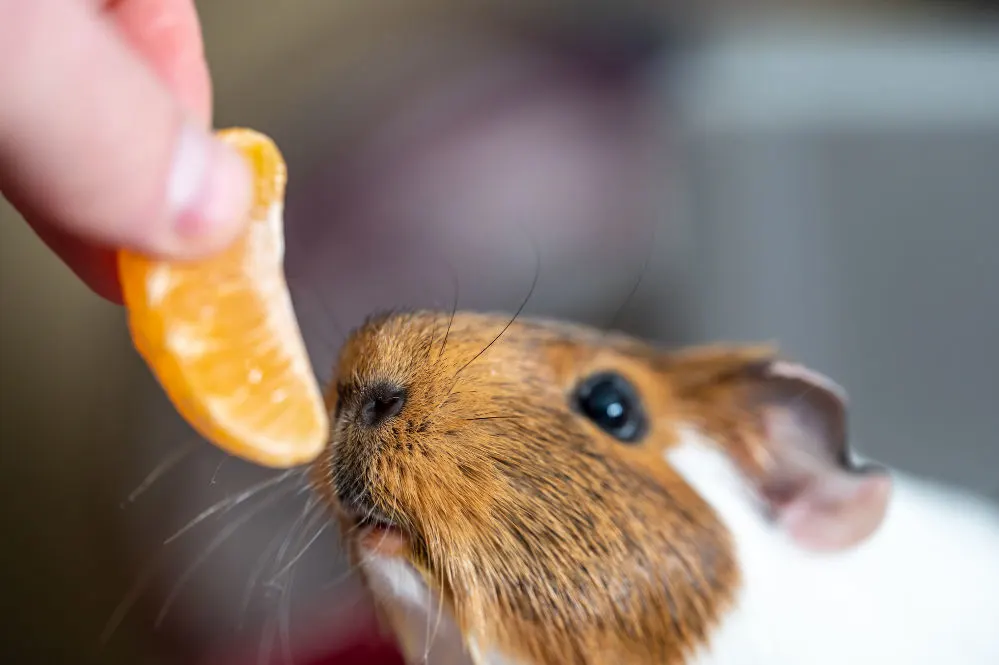
In short: yes, it is! But only in small portions, for very important reasons. Keep reading to discover why guinea pigs can have mandarin oranges, and what the safe amount to give them is.
But first, there are other important things you should know about mandarin oranges before you spoil them with such treats.
Do mandarin oranges have nutritional value for guinea pigs?
As you might’ve guessed, the answer is yes. Mandarin oranges are both tasty and nutritious for piggies. A medium mandarin orange, which weighs about 3 oz (88 g), can contain up to 0.5 oz (13 g) of carbohydrates, 0.07 oz (2 g) of fiber and up to 0.3 oz (9 g) of sugar. They also contain about 0.002 oz (43 mg) of calcium.
But, you might already know that vitamin C is the real focal point of a mandarin orange’s nutrition. Mandarin oranges have a vitamin C content of about 0.00004 oz(1 (mg), which makes them a great source of such an essential nutrient for guinea pigs, and great source of antioxidants, too.
While fiber and calcium are essential nutrients and important for a guinea pig’s bone health and for preventing gastrointestinal illness, fresh oranges are especially nutritious for their vitamin C content. Cavies, like humans, cannot create their own vitamin C and rely on ingesting it through their diet.
For this reason, mandarin oranges have great health benefits if you need to supplement your cavy’s vitamin intake.
Are there any risks in giving guinea pigs mandarin oranges?
While a mandarin orange’s high sugar content may be small for humans, for guinea pigs it can be excessive and may upset their health. Their acidity also poses a threat to guinea pigs’ health if they are eaten too much or too frequently.
Due to this, mandarin oranges, and any other orange tagging along, are better suited as occasional treats for your guinea pig. Once or twice a week, given in small amounts, is more than enough to satisfy their (small) sweet tooth.
Does this mean that guinea pigs can eat other citrus fruits?
Not all citrus fruits are safe for a guinea pig’s diet. Fresh oranges, including blood oranges, satsumas, and tangerines, are safe for moderate consumption as long as they are fresh and clean.
However, other citrus fruits like grapefruits, lemons, and limes are not acceptable for a guinea pig’s diet. These fruits are highly acidic and therefore can cause great harm to them. The excess acidity can cause painful mouth sores and can negatively impact their digestion.
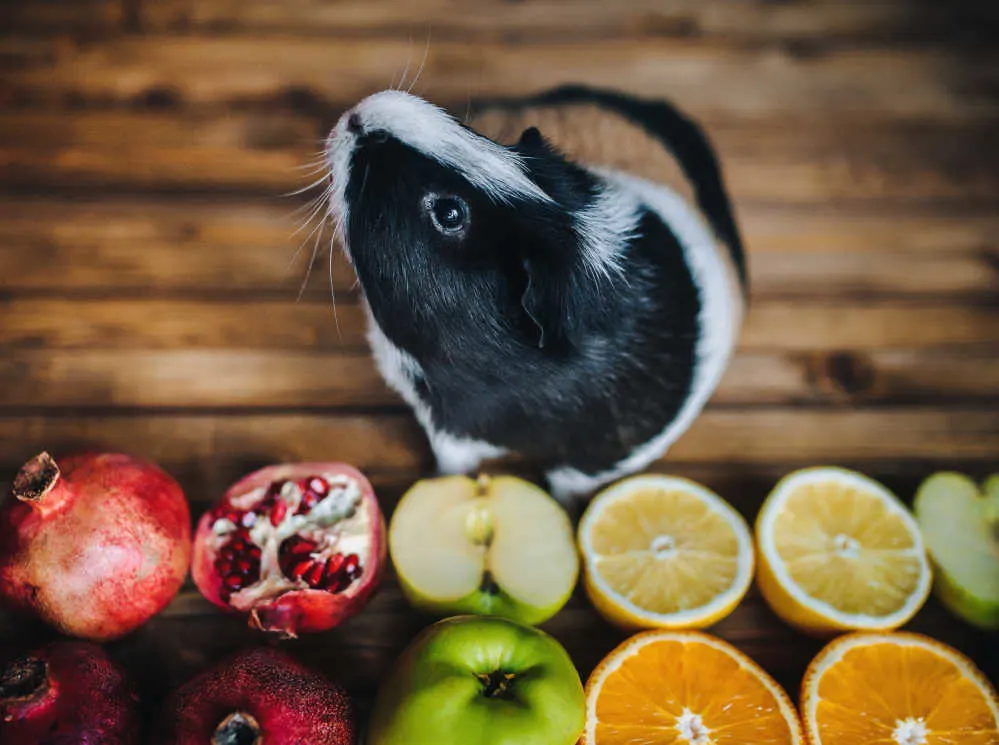
Can guinea pigs eat orange flavored products?
Generally, you should not be feeding your guinea pigs any orange by-products. Even some organic sources like orange juice are not suitable for piggy consumption as the sugar and acid concentrations in this product can be too high for them to safely consume.
You should also avoid feeding your guinea pig any kind of canned oranges, including mandarins. Not only do these contain other ingredients like preservatives and sodium, but they also have a higher sugar concentration which can be harmful to guinea pigs’ teeth and general health.
You should also steer clear of any orange or mandarin orange marmalades for the same reasons.
What parts of the mandarin orange can guinea pigs eat?
Apart from the actual fruit, you can feed them a piece of the mandarin orange peel so long as it is properly washed. Orange peels are equally rich in Vitamin C and 100% natural, although you should make sure that it is strictly organic fruit to avoid pesticides.
Preserved orange peel has added sugar, though, so that’s a no-no. You should also pick out any seeds beforehand as guinea pigs cannot eat orange seeds and they could pose a choking hazard if accidentally eaten.
How should you feed your guinea pig oranges?
Despite their relative largeness as a rodent, guinea pigs are still too small to consume an entire fruit in one or even several sittings. Hay and grass should make up about 80% of their meals, so you should only prep small pieces at a time.
You’ll want to start by first picking the right mandarin, as you should only serve the freshest produce to your guinea pig. When you’re sure that your mandarin is ripe and ready to go, then it is time to thoroughly wash off any lingering pesticides or bacteria.
The next step is to cut up your mandarin orange into small pieces, maybe one or two teaspoon-sized chunks. This can be for the fruit or the mandarin peel, though you’ll want to separate them as it might be too much for them to simultaneously chew through both.
This is also when you should check for any pips in your piggy’s serving. Remember to be thorough.
Finally, make sure to clean away any scraps of the peel or fruit that are left over as soon as they’re done eating as you don’t want bacteria to fester. Always make sure that your guinea pig’s water dispenser is full and fresh, in case they need to wash down these tasty treats.
Remember that these should only be given as treats, so once or twice a week is more than enough to incorporate mandarin oranges into their diet. The portions should also be kept small — it is always better to be safe than sorry!
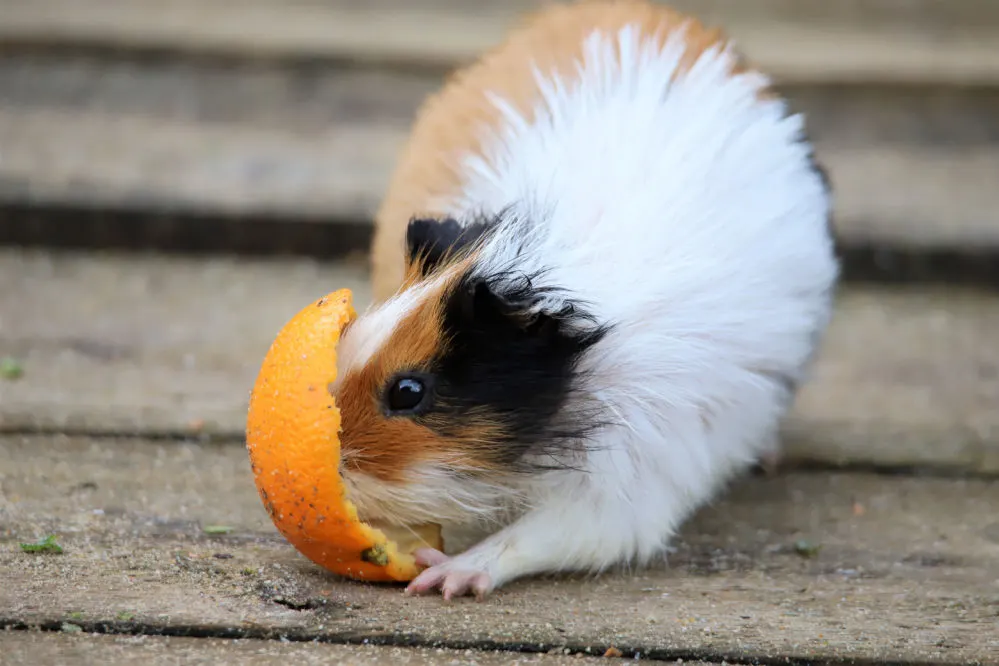
How many mandarin oranges can they eat for their daily vitamin C intake?
A guinea pig’s daily intake of vitamin C should be between 0.00004 oz (10 mg) and 0.002 oz (50 mg). As the vitamin C concentration is only about 0.0004 oz (1 mg), this means that one whole mandarin is still not enough to sustain your cavy’s vitamin C needs.
It does not mean that you should feed your guinea pigs more mandarin oranges, though. You should still only feed your guinea pig small pieces of a mandarin orange once or twice a week as a delicious treat. You should only give them small pieces of orange and never a whole orange.
If you’re looking for sustainable vitamin C supplements safe for your piggy, then your best bet is to get some commercial supplements like vitamin C treats.
If your cavy is not receiving their dosage of Vitamin C on a regular basis, you risk subjecting your guinea pig to serious health problems. This can cause illnesses like scurvy or even abnormalities in their bones, blood vessels and connective tissues.
What happens if my pet guinea pigs eat too many mandarin oranges?
If you have snacked on a mandarin orange, you may already know that the fruit’s natural sugar content provides a sweet balance to the sour acidity. This may be permissible on a regular basis for humans. However, for guinea pigs, mandarin oranges can be too much of a good thing and can have dire consequences.
Firstly, the naturally occurring sugar content can be too excessive for a guinea pig’s health even if they are only eating small pieces every day. The sugar content will not poison them, but too much sugar can upset their intestinal bacteria and cause possibly fatal diarrhea in your guinea pig.
Secondly, if your guinea pig does eat too many mandarins, the excess acidity could cause mouth sores to develop. This would not only inhibit your pet’s ability to eat, but it also poses a threat to their digestive system.
Finally, mandarin oranges are a good source of calcium. Guinea pigs need calcium to keep their bones and specifically their teeth strong. However, too much calcium can cause the formation of painful stones in a guinea pig’s bladder and kidneys.
Thankfully, there isn’t really such a thing as giving your guinea pig too little mandarin oranges. They will certainly survive if they are only given a piece every now and then, although you should still make sure that they are getting that vitamin C intake elsewhere and regularly.
Otherwise, it would be in your best interest to ensure that this occasional treat remains exactly that. For both you and your pet’s wellbeing.
Are there other products you can give your guinea pig instead of mandarin oranges?
As they are strict herbivores like rabbits, their meals should mostly consist of hay or grass and dry pellets with small portions of fresh and washed produce. Fruits and veggies like mandarin oranges are great for easy vitamin C hacks, but some options provide more nutritional benefits than others.
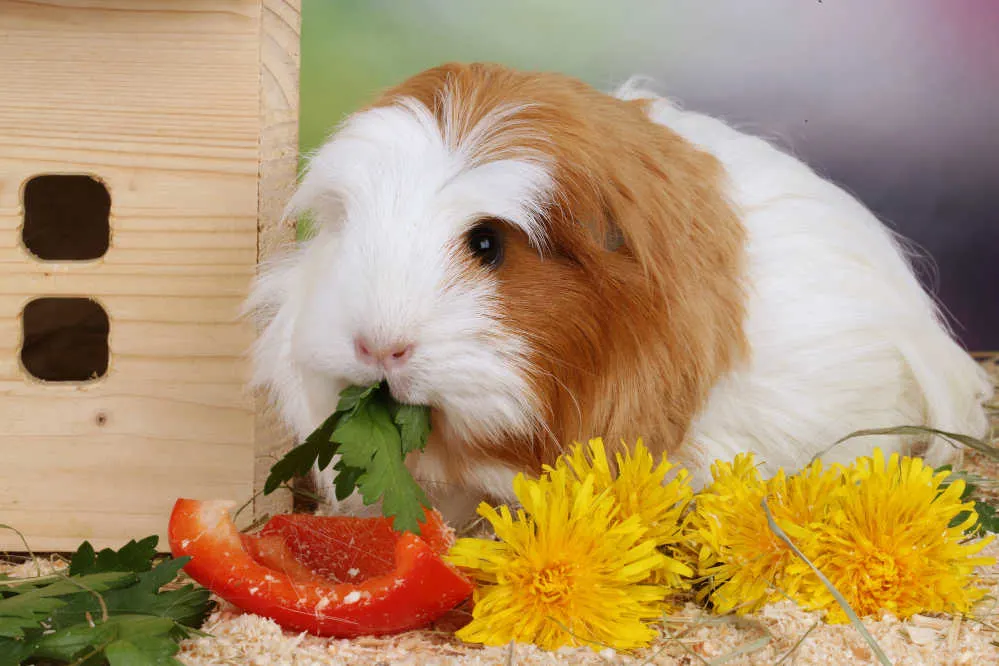
If you’re looking to treat them with something that has a high vitamin C content like a mandarin orange, but without the sugar, then try alternating with a vegetable like spinach. This is one of the best vegetables for guinea pigs because it’s both a good source of vitamin C and has a significantly lower sugar concentration than mandarin oranges.
However, as a conscientious pet owner, you should still be cautious to only serve produce to your guinea pig in small portions as a guinea pig’s diet needs to consist mainly of hay for their digestive health. A combination of typical guinea pig food, including pellets, fresh water, and moderate quantities of fresh vegetables that are rich in vitamin C should keep them happy and healthy and not in need of a liquid supplement.
How to introduce mandarin oranges to your guinea pig’s diet.
Guinea pig pet owners know that these furry friends can be picky eaters at the best of times. So if you’re thinking of introducing mandarin oranges to their routine, be prepared to take it slow. Guinea pigs, especially older ones, do not respond well to sudden changes in their diets.
If your guinea pig already enjoys the sweet goodness of a mandarin but you’re not sure that you’re giving the safe amount, then you should watch your cavy closely after serving. If they enjoy the fruit, you will usually hear their excitement long before you see it.
How to tell if regular oranges are making my guinea pig sick?
Because guinea pigs are prey animals, it is their natural instinct to conceal any weaknesses like an illness. And as mandarin oranges can make your guinea pig ill if given too often, you’ll want to watch them closely for any signs of sickness.
Some of the easier ones to spot are any changes in their behavior, including lethargy, loss of appetite or more frequent hiding. You should also try to consult with your veterinarian at least once a year to ensure that your guinea pig is in good health and if their diet is adequate.
Your cavy’s poop is specifically what you need to keep your eye on if you’re worried about how mandarin oranges are affecting their diet. It’s natural to wonder why your guinea pig poops so much, but so long as their stools are dry and frequent, they are healthy.
There is a small chance that their appetite will change, but it’s always best to stay on top of your furry friend’s needs.
Final thoughts on feeding guinea pigs mandarin oranges
By now you know that your guinea pig deserves a little treat every once in a while, even if it is just for being so impossibly cute. But even all that cuteness should not stand in the way of your cavy’s hopefully long and happy life.
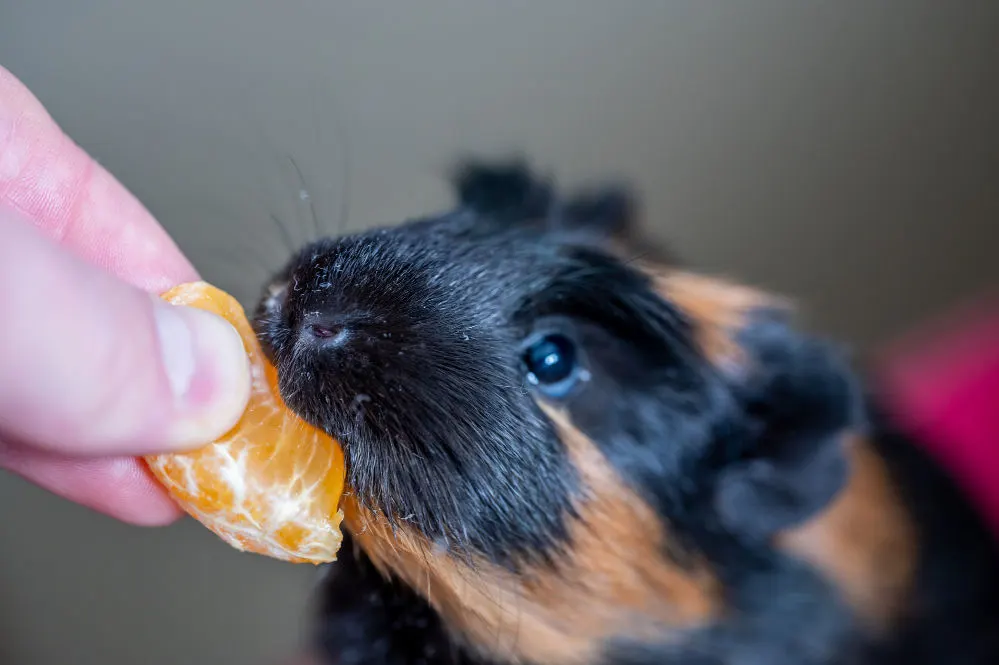
So, it is not a crime to treat your guinea pig to a juicy piece of mandarin orange every now and then. But you should not let this distract you from what your pet truly needs nutritionally and what is best for their little bodies.
Like humans, guinea pigs can have a lot of some things and should only have a little of other things. As long as your pet is given a regular healthy diet, with a sufficient vitamin C intake, then a little sweet treat once or twice a week is more than enough.
Steph Dyson is a travel journalist by trade but a lover of all small pets. She’s been a pet mum to everything from gerbils to guinea pigs, rabbits to hamsters, and fish to dogs of all shapes and sizes. She wants to share her years of experience with small pets and make Small Pet Guides the go-to website for pet owners seeking information and care advice.

